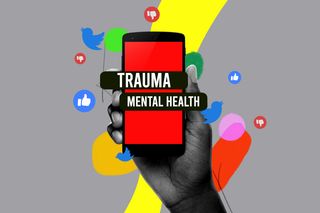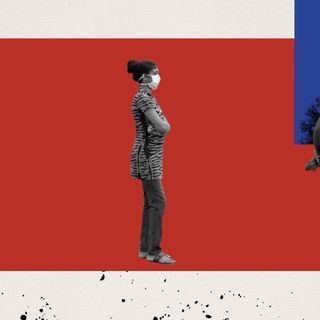
The Internet Is an Emotional Outlet for Many — But Is Crying Into the Void Helping People Heal?
After model Chrissy Teigen shared photos of her miscarriage on Instagram, social media users started debating the value of processing emotion online.

K., 28, had just escaped an abusive marriage, without any help from her family. Frustrated, one day, she told her mother to fuck off, but found herself without an outlet to release frustration and express the relief she had felt in the moment. That is, until she logged on to her Twitter account, wrote two simple lines about telling her mother off, and saw the support pour in. “Half an hour in, people reached out to me asking ‘Are you okay? Do you want to talk?’ I have the WhatsApp numbers of these people, so I could have initiated a conversation with them. But after the whole ordeal, I couldn’t talk to anyone. Twitter eased me into it,” K. said.
For K., Twitter has served as an invaluable platform for coping, for her to be heard and seek validation for her experiences. “It gave me some sort of courage that I wasn’t alone in this. That it’s quite normal to go through abuse in one’s own life, that I wasn’t a monster,” K. said. “And you know, sometimes, people are far more kind to strangers on the internet than they are to the people they know.”
K.’s process — using social media to voice and work through emotions — is one common across social media but criticized as being attention- or sympathy-seeking. The most recent example was when Chrissy Teigen posted pictures of herself grieving after her miscarriage. Almost instantaneously, followers accused her of faking grief, or performing it, simply because she chose to express it virtually. What these critics missed is that social media has become a definite part of reality for many around the world. It’s a tool people use to bare their deepest, darkest emotions, and in turn, process feelings using their anonymous followers as a sounding board. And for some, this practice is invariably better and safer than the reality they’re experiencing offline.
In a world where mainstream media normalizes, and even celebrates, male experiences, suppressing and alienating all others, social media can serve as a safe haven. For K., it proved a powerful tool to process partner abuse; for Teigen, it served as a platform to express grief around a deeply painful, often overlooked experience unique to female bodies.
Related on The Swaddle:
‘The Social Dilemma’ Told Us What We Already Knew. Then Why Was It So Shocking?
The one thing that allows people to express intimate emotions, according to S.S., 24, is anonymity — which social media provides unconditionally. “I’m just a voice in the void,” she says, taking comfort in the fact that she has kicked off all her known and loved ones from her Twitter followers and can completely be herself online. “Without revealing personal details, I can be as personal as possible.”
The direct benefit of such anonymity, Esha, 25, says, is “I don’t have to think too much or pretend to be calm or composed. I can enjoy the things I enjoy without any judgment, and I don’t have to care too much. It’s also easier for me to let anger or frustration out of my system,” without shouldering the burden of carrying other people’s feelings in response to hers, she says.
“Therapy is taboo, talking about distress is seen as self-serving, so where can we go?”
Using social media to navigate emotions can also serve as a way to unburden oneself of the guilt that accompanies asking someone for help, Deepshikha, 21, says. “When sharing with a friend, [they] might feel obliged or compelled to respond, to help or to offer words of comfort. On social media, none of that holds good. No one is obliged to say anything at all,” she says. “Sometimes, one might want to just vent without necessarily wanting to be told anything.” She calls the support she receives on social media “unexpected.” Being offered help without necessarily asking for it makes the process “devoid of that guilt.”
“Sometimes, you feel your friends are just saying this because they’re supposed to support you. But when strangers are validating your loss or grief, without any reason to do so, it can mean more,” says mental health professional Deepika Bhandari. When you’re at a low point, all you need in the moment is some hope, some semblance of solidarity that says you’re not alone, Bhandari adds. This is especially true for women, she says, who are taught not to put themselves first and, in Indian households, are often isolated within their families, without strong links to the outside world, links that can put their experiences in perspective. If you can shout out your struggles, like on social media, and find them accepted, even matched by others, it’s easier to open up, she says.
This approach also helps people navigate mental health issues. “Initially, I had no idea how to talk about my mental health. I would just tweet something like, ‘When will I stop crying my eyes off to sleep,’ and feel like I had expressed myself with little to no consequences,” shares Adishi, 26, who used to struggle with suicidal ideation. The anonymity offered by social media, and a lack of expectations that accompanies shouting into the void to a bunch of strangers, she says, was affirming. Eventually, she found a community that contributed to her healing and helped her treat herself with less doubt and hatred. Even when she started seeing a therapist, Adishi says, Twitter was where she took her doubts and concerns during the process, and Twitter is where she was reassured to keep going.
Social media can instill hope because it breaks through the isolation, opening up a world where it’s possible to connect with people who are suffering through similar issues, who can provide alternatives from experience — in turn, normalizing seeking help, Bhandari says.
Related on The Swaddle:
Using Social Media to Cope With Stress May Cause More Stress
Laying bare emotions online is particularly revolutionary for people in South Asia, behavioral researcher and therapist Ruchita Chandrashekar says. “Putting stuff out there is culturally seen as wrong. You’re not supposed to talk about personal stuff. But we have to realize this notion is a tool that ables shame,” she adds. “If someone can put their emotions out there, then it disables that internalized shame we feel as a culture.”
South Asians don’t have normalized spaces at a community level where people from marginalized spaces can go and voice these emotions and experiences, Chandrashekar explains. “Therapy is taboo, talking about distress is seen as self-serving, so where can we go?” she asks.
Social media also proves instrumental in opening up the world to people who are struggling to gain acceptance for a part of their identity, who often find themselves alone in a patriarchal society that punishes, isolates any sort of deviance from cisgender and heterosexual norms.
“As a queer person … I have tried to be my authentic self on the internet. I use it as a means to release [frustration] and sometimes to find a community,” Aditya Tiwari, 22, says. “I sometimes go on social media when I don’t have anyone around me to talk to, so I just vent out or try to find someone who can hear what I feel.”
But it’s not all beneficial, Tiwari says. “When I do [this], a lot of strangers are entitled to give their opinions. It can be good or bad but it eventually affects me in a way I don’t want to be affected,” he adds. “I might be feeling happy about something really small, but if someone comes up to me and says that ‘Oh, it’s a really a small thing to be happy about,’ it just affects me and I [question] the happiness that I’m feeling … ‘Is it even worth it?’” Tiwari says he has become unable to make decisions in his life mostly due to his concern about how people on the Internet will perceive him, making the process of opening up to others on social media “a double-edged sword.”
The bottom line is that “there is benefit in understanding how some of these systems work. It’s not your diary,” Chandrashekar advises, calling being vulnerable on social media “a tightrope.” Without being able to control who and how people respond, users should consider the fact that they can be subjected to even more trauma online. “There’s no point romanticizing the notion of being able to share without limits on social media, because we know it comes at a cost. People might crave momentary release, but they also need their self-preservation in place,” she adds.
Related on The Swaddle:
A Psychologist’s Guide to Reducing the Impact of Social Media
Setting these expectations is even more imperative for people who grew up with the internet as their reality. Yashika Singla, 16, says she thinks of social media as priority number three in her life, after food and sleep, with most of her friends being from or existing on the internet. “I literally process things online — [from] achievements to getting a reply from a crush to being ghosted by someone close, I come to terms with what I am feeling when I elaborately type my experience in any social media domain,” she says. “It just helps me meet the world and myself, identify my own behavior and preferences and strength.”
Chandrashekar cautions against treating social media as the end-all be-all for emotional health, especially for dealing with emotions arising out of trauma and mental health issues. While a sense of validation and community may be a result for some, social media cannot be a coping mechanism that facilitates long-term healing. “It’s a balance of rationally thinking about what you share, while having an offline support system,” Chandrashekar says.
Ultimately, the internet can be an invaluable resource for anyone to understand and process their experiences and to speak their truth in non-judgmental, community environments, especially for someone from a marginalized group. The internet’s transient nature, the vastness that lends itself to anonymity, and its pervasiveness around the globe, functions as the perfect, albeit temporary, outlet. As K. says, “The internet always remembers, but the internet also forgets in a jiffy.” But when the internet moves on, it’s important to realize we often don’t.
Rajvi Desai is The Swaddle's Culture Editor. After graduating from NYU as a Journalism and Politics major, she covered breaking news and politics in New York City, and dabbled in design and entertainment journalism. Back in the homeland, she's interested in tackling beauty, sports, politics and human rights in her gender-focused writing, while also co-managing The Swaddle Team's podcast, Respectfully Disagree.
Related


15 Total, Not Consecutive, Minutes of Covid19 Exposure Now Makes One a ‘Close Contact’: U.S. CDC
